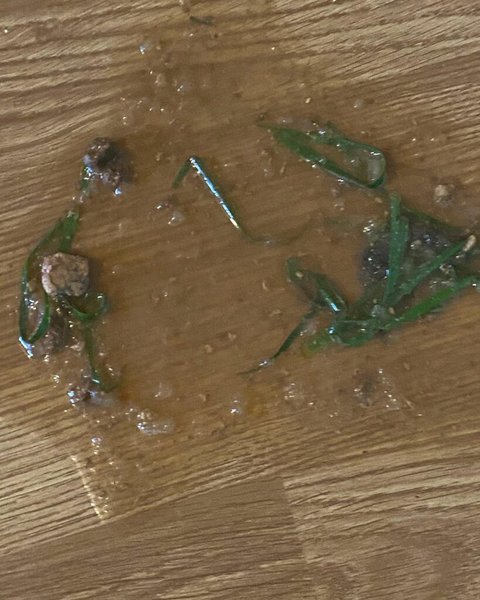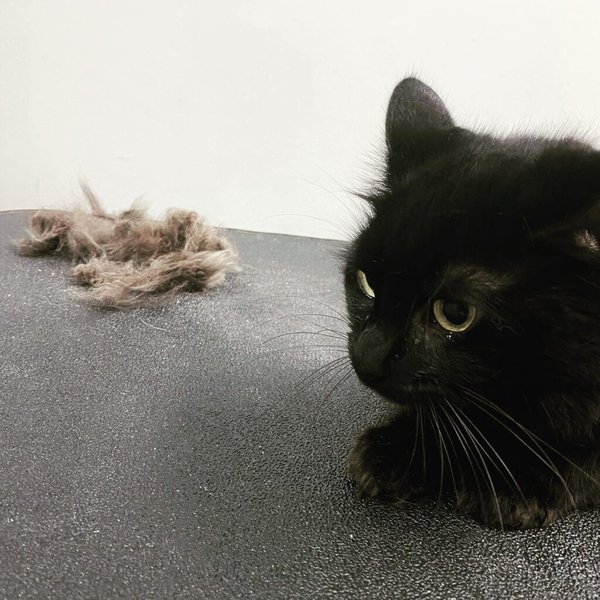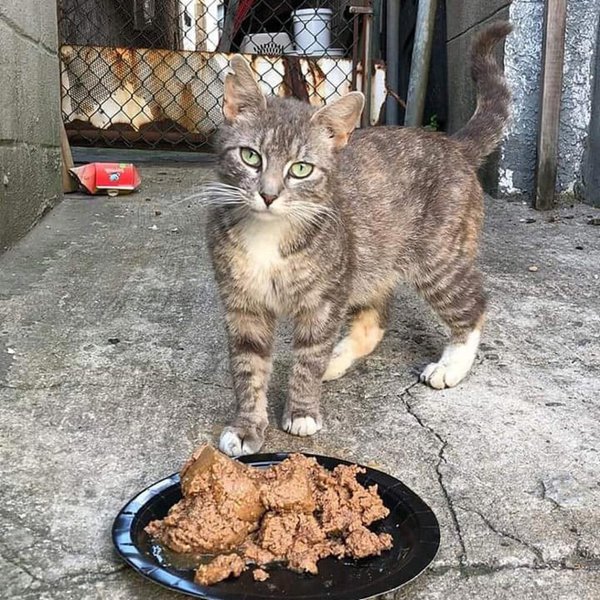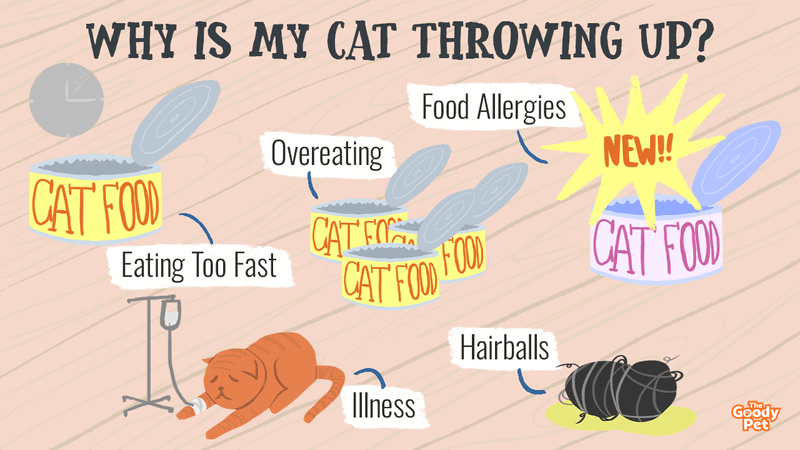The mournful meow, the gagging, and the unpleasant surprises on your favorite rug all set off alarm bells. Is my cat sick and more importantly, should you be worried?
If you need help because your cat keeps throwing up, there is no need to worry. In most cases, cats will throw up due to stomach irritation. From hairballs to eating too fast or even indigestion, there are many reasons why your kitty may be throwing up. Cat vomit is not always a cause for concern unless it is a symptom of an underlying illness.
So, when exactly should you worry about your cat vomiting? If your cat keeps throwing up and you are not sure when to seek veterinary assistance we are here to help. Before you panic, here is everything you need to know about cats and vomiting and when you should be worried.
Is It Normal For A Cat To Throw Up Every Day?
Help! my cat keeps throwing up, is a statement many cat owners have uttered once or twice. In most cases, if your cat throws up a couple of times a month, that should not worry you.
When To See The Vet
If your cat is throwing up too frequently this can be a symptom of illness or an underlying issue. It is not normal for a cat to throw up every day. If your kitty is throwing up multiple times a day consecutively, you should seek help from your vet.
Watch out for other symptoms such as weakness, or loss of appetite, or diarrhea that could point to an underlying illness.
Why Is My Cat Throwing Up?
Eating Too Fast
If your cat throws up barely digested food immediately after eating, the most common reason is eating too fast.
Overeating
If your cat eats too much food, they are likely to throw up. This is why it is recommended that you feed your cat small portions throughout the day rather than large single meals.
Food Allergies
If your cat is allergic to something in their diet they will likely throw up. Always check for any allergens especially when trying out new cat foods.
Hairballs
In long-haired cats, throwing up hairballs can be a common occurrence. Since cats groom with their tongues they may ingest hair which they later end up vomiting.
Illness
In some cases, your cat may be throwing up due to an illness. In such cases, your cat will probably have other symptoms like weakness, loss of appetite, or diarrhea.
Is Vomiting A Sign Of Stress In Cats?
Our furry friends are not immune to stress. Pets, just like humans, experience anxiety. Factors like separation anxiety, a change in routine, or a new home can all trigger your kitty’s anxiety.
Is Your Cat Stressed Out?
So, can vomiting be a sign of stress in cats? Yes, stress can cause your kitty to have tummy upsets leading to vomiting and diarrhea. Apart from vomiting, if your kitty’s stomach hurts you may notice the following symptoms: discomfort, loss of appetite, retching, and hiding.
Other signs of stress in cats include:
- Litter Box accidents may be a sign of anxiety especially if your cat is house trained.
- Cats are notoriously aloof. However, if your cat seems to be hiding from you more than usual, this could be due to stress.
- Meowing incessantly or your kitty being unusually vocal can be their way of communicating their anxiety.
- A stressed-out cat can become aggressive. If your kitty is lashing out at people or other animals, this can likely be due to stress.
Vomiting After Vaccination – Should You Worry?
Vaccinations are necessary to keep your cat healthy. In some cases, your kitty may react to being vaccinated. Vomiting is not a common reaction to vaccination. However, in some cases, vaccines can upset your cat’s stomach leading to symptoms such as vomiting and diarrhea.
Other side effects of vaccinations may include fever, loss of appetite, and lethargy. In most cases side effects from vaccination wear off in 24 to 48 hours. If your kitty still has adverse reactions days later, it is best to speak to your vet.
What Does The Color Of Cat Vomit Mean?
Examining your cat’s throw-up may not be your idea of fun, but it may help you pinpoint the cause of the vomiting. So, what does the color of your cat’s vomit mean?
Clear Liquid
If your cat is throwing up clear liquid it could be an indication that their feeding schedule is irregular. The clear liquid in your kitty’s vomit is made up of gastric acid and mucus.
When your cat has not eaten for extended periods, the gastric acid starts to irritate the stomach which leads to throwing up. In this case, the vomit will be a clear liquid. Clear vomit can also be due to hairballs or other indigestible materials in your cat’s stomach.

Yellow Liquid
If your cat’s vomit seems to be yellow or shades of green in color this indicates the presence of bile in the vomit. Bile is a digestive juice that is normally produced in the liver. When your cat has not eaten for long periods, the bile can irritate the stomach leading to vomiting.
In some cases, yellow vomit may be a sign of liver disease so it is always best to have your cat checked. Feline pancreatitis may also cause your kitty to vomit yellow liquid.
White Foam
When your cat vomits white foam, it is often because they have eaten something they shouldn’t have. Hairballs may also cause your cat to vomit white foam.
In some cases, gastritis may cause your kitty to throw up white foam. In most cases, a cat with gastritis will also have other symptoms such as dehydration, lethargy, or blood in the vomit or feces.
What Can I Do For My Cat That Keeps Throwing Up?
Regulate Feeding
If your cat is throwing up white liquid this is mostly due to extended periods of not eating. When your kitty does not eat regularly, gastric juices can irritate the stomach leading to vomiting.
A cat may also throw up yellow liquid when the stomach is empty. To remedy this, make sure that your cat feeds on a regular schedule. It is recommended that you feed your kitty small meals throughout the day.
Try the Cat Mate C50 automatic cat feeder. It serves up to 5 meals per day and works based on a schedule you set up on its digital timer.
Check For Toxins Or Allergens
Most cats are picky eaters but some kitties will try anything. If your cat is throwing up white foam, it is likely because they ingested something they shouldn’t have. Always check that your kitty is not exposed to possible allergens or toxins.
It is important to read cat food labels to check for allergens. If your cat starts vomiting after introducing a new type of food, there may be allergens in it.
Keep Up With The Grooming
If your cat is throwing up white foam, this can be due to hairballs. Hairballs are a common problem, especially for long-haired cats. Keeping up with your cat’s grooming needs will help to minimize shedding.

Slow Down Feeding
Eating too fast is one of the most common reasons cats throw up. You can help your cat slow down by breaking down their meal into small bite-sized pieces. This will make digestion easier and prevent vomiting.
Consult Your Vet
If your cat vomits frequently, it is best to seek assistance from the vet. Vomiting may be a sign of an underlying condition so always have it checked out if it is too frequent or accompanied by other symptoms.
Should You Feed A Cat After It Vomits?
Caring for your kitty after vomiting will help ease their discomfort and avoid further irritation to the stomach.
Withhold Food For A Few Hours
After your cat vomits, avoid feeding it for a few hours. This will give the stomach time to settle. After a few hours, you can try feeding again but in small portions.
Also, allow your cat to drink water in small quantities to avoid dehydration. You can resume your regular feeding schedule after 24 hours.

Switch To A Bland Diet
When your cat has an upset stomach, feed them a bland diet such as plain chicken or rice to prevent further irritation to the stomach. We recommend Nom Nom Cat Food, which is made using real chicken and does not contain additives or artificial preservatives.
Alternatively, your vet may also recommend a prescription diet depending on your cat’s condition.
You may also give your cat plain unflavored Greek yogurt when their stomach is upset. The live cultures in yogurt are beneficial for digestive health.
Comfort Your Cat
When your kitty is vomiting, it is important to try and ease their discomfort. Cuddling or petting your cat will help to soothe them. Ensure that they have a comfortable and quiet place to rest.
In most cases, an upset stomach will last for 24 to 48 hours. Ensure your cat gets enough water during this period to keep them hydrated. If symptoms persist, seek medical assistance from your vet.
Related Questions
How Can You Tell If Your Cat Has Been Poisoned? You can tell if your cat has been poisoned if they start displaying the following symptoms: vomiting, bloody diarrhea or vomit, loss of appetite, weakness, drooling, twitching, and dehydration. Symptoms of poisoning will vary based on the particular toxin ingested. Some toxins will react immediately while others may poison your cat gradually.
What Can I Give My Cat For Vomiting And Diarrhea? Give your cat bland food and fluids for vomiting and diarrhea. A bland diet of easily digestible food given in small portions helps to avoid further irritation to the stomach. Your vet may also recommend anti-nausea medication to help ease the vomiting.
How Do I Know If My Cat Is Traumatized? You will know your cat is traumatized if there is a change in their behavior. Some signs that indicate stress or trauma are hiding, excessive vocalization, and litter box accidents. In some cases, a traumatized cat may lash out at people or display aggression towards other pets.





